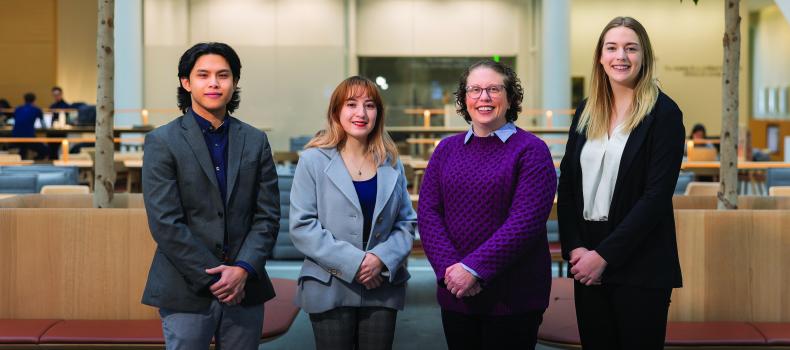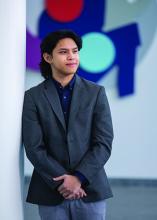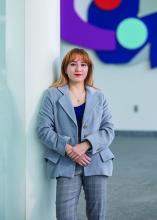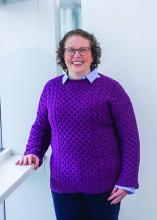Profiles of Promise
Scholarship funding empowers next generation of nursing talent and research
Writer: Mark Oprea
As Dean Carol Musil, PhD, RN (NUR ’79; GRS ’91, nursing) addressed the audience during the centennial celebration of Case Western Reserve University Frances Payne Bolton School of Nursing, she announced a major new initiative.
The School of Nursing would be kicking off a $5 million scholarship campaign for its students, she told the crowd. “We come together tonight to ask, ‘What’s next?’” she said, “‘What does that future look like?’”
The kickoff came in the midst of major shifts in the profession. Three years of COVID-19 dramatically exacerbated the national nursing shortage, a crisis fueled by built-up burnout, long hours, aging equipment, and challenges to the mental health and wellbeing of healthcare professionals. A 2023 U.S. Registered Nurse Workforce Report Card suggested the country will face a deficit of 500,000 nurses within the next six years.
Making the profession more accessible is key to attracting more people to the nursing profession. To that end, Frances Payne Bolton School of Nursing strives to provide all of its students with some level of financial support—an aim that will be bolstered by the new campaign.
Such funding helps students spend less time worrying about how to pay their tuition bills and more on the topics that will help them grow as nursing professionals, as evidenced in the following stories.
Protecting patient privacy
As Audrey Smallman watched her peers in hospital halls during clinicals, her observations sparked her latest research project.
“We noticed nursing students in the clinical setting unsure about how posting on social media platforms could impact patient privacy and confidentiality,” Smallman said. “And that could put our clinical reputation—or the school’s relationships with clinical sites—in jeopardy.”
Smallman, a third-year Bachelor of Science in Nursing student, had a profound realization: Not only could a random Instagram Reel or Facebook Live recording be a violation of a patient’s federal privacy rights, but there was no educational standard for social media use for nurses in training.
Last year, under the guidance of faculty advisor Catherine Mohney, RN, Smallman and a group of students drafted a resolution against social media usage in clinical settings for the National Student Nurses Association (NSNA) to consider. Smallman saw this as “a total black-and-white issue”—that students should be protecting patient privacy and not using social media. Yet she continued to see her peers—and patients’ families—unsure of how to navigate the subject.
Smallman, Mohney and a team of student writers drafted and submitted their resolution to NSNA. Then, they traveled to Nashville to present it to the NSNA’s House of Delegates, which annually reviews and makes recommendations about nationwide policy changes.
The panel agreed with Smallman and her group and formally endorsed the resolution. They made a recommendation to their constituents, particularly higher education institutions, to train nursing students annually about social media usage and HIPAA compliance. Further, they should “update policies regarding technology and social media use in the healthcare setting” to ensure patient privacy.
Smallman, who has been working as a part-time nursing assistant at University Hospitals, hopes to intern in pediatrics next, and eventually pursue a nurse residency in Cleveland. But first, she will be embarking on a study abroad trip to Taiwan to study global healthcare, culture and climate change—a trip that is fully funded by a scholarship from the School of Nursing.
Smallman will also travel to the NSNA conference this year, but this time, she’ll do so as a newly elected member of the resolution committee, where she’ll be reviewing proposals much like her own.
Improving the profession
Glenford Ona’s interest in becoming a nurse researcher began when he was a child, growing up in the suburbs of Philadelphia.
Raised by two nurses, Ona would often accompany his mom when she worked as a floor nurse at Penn Presbyterian Medical Center. Later, as a teenager, he’d hear firsthand experiences about the profession’s shortcomings from his parents.
“I saw what it was like,” Ona said, “and I thought, ‘Why isn’t it better? Why isn’t someone making it better?”
In 2019, Ona decided he would be that someone. As an incoming first-year Bachelor of Science in Nursing student at the School of Nursing, he interviewed with his now-mentor Joachim Voss, PhD, RN, the Independence Foundation Professor of Nursing Education, as part of the admissions process. Voss encouraged Ona to seek academic answers to his questions.
Ona has worked with Mary Dolansky, PhD, RN (GRS ’01, nursing), the Sarah C. Hirsh Professor, on a number of House projects. But to get answers for his questions about the profession, he is shadowing Dolansky to observe what he calls “implementation science put into practice.” Through field research, Ona hopes to convert nurses’ advice into usable hospital policy. “Some people have pediatrics, some people have oncology,” Ona said of nursing specializations. “But I want my target population to be nurses.”
Like others, Ona is supported by a scholarship from the School of Nursing. Other expenses are covered by grants, a summer job at Penn Presbyterian Medical Center and help from his parents. He plans to pursue a PhD eventually, but after he graduates next spring, the aspiring researcher will first follow in his mom’s footsteps by spending a year as a floor nurse.
“If I can understand how the ground floor works, if I immerse myself,” he said, “I can use those experiences to inform my ideas. I can better alter it because I can understand.”
Clarifying care for veterans
According to the U.S. Department of Veterans Affairs, veterans are more than twice as likely to have Type 2 diabetes. When patients are diagnosed with the disease, the doctor shares new terms and concepts: insulin resistance, glucose intake, hypoglycemia, hyperglycemia. Add on “what-ifs” and existential stress, and patients can start to feel overwhelmed.
It was this scenario that compelled Rebecca Holliman, a fourth-year Bachelor of Science in Nursing student, to examine clearer ways of explaining diseases and their treatments to patients—especially veterans. Hollimon and another student, Lear Wang, were working toward their clinical hours for their capstone project at the Lake County Veterans Affairs Clinic in Willoughby, Ohio, where they were able to work with staff to gauge key medical literary issues amongst their patients.
Using their experiences, as well as literature from the American Diabetes Association, Hollimon and Wang wrote a six-page booklet on diabetes care—crafted specifically for a veteran audience. Their finished booklet details everything from treatment, meal planning and physical activity to “causes of low blood glucose,” accompanied by a symptom chart illustrated with military cartoons.
“We wanted to compile all the information to make it shorter and easier to read,” Hollimon explained.
Hollimon is originally from Chicago, and grew up in a family with a low income. It was ultimately her experience with her mother’s poor health that spurred her interest in a career in nursing. Thanks to a generous scholarship from the School of Nursing, Hollimon no longer has to work three jobs to pay her way through college.
“Receiving scholarships from the school definitely helps with giving me more time to focus on the college experience and education,” Hollimon said. “I can work one job, and I don’t have to be super stressed about getting an income.”
That is, until she graduates. By summer, after taking the state board exams and visiting family in Seoul, South Korea, she’s aiming to return to Chicago to work at a local hospital.
“I want to support my mom,” Hollimon said. “For me, [it’s about] getting a stable income. This is all about giving back.”
A doctorate, delayed no more
Megan Foradori’s pursuit of a PhD has been, she likes to say, nearly two decades in the making.
After graduating from Johns Hopkins University School of Nursing with a Bachelor of Science in Nursing in 2004 and a master’s in 2009, Foradori put off pursuing her doctorate. She moved around the country, working as a nurse in North Carolina, Texas and Pennsylvania. “But, through it all, a doctorate had always been in the back of my mind,” she said.
Then, in 2019, she enrolled in the doctoral program at Frances Payne Bolton School of Nursing. Foradori chose to focus on the identification and treatment of developmental delays in children.
“It’s those milestones you think about as children grow,” Foradori continued. “Are they walking? Are they using their hands well? Are they relating to others? These foundational proficiencies help them learn and build more complex skills, even before reaching school.”
For her dissertation, Foradori studies providers’ efforts to screen and diagnose children with developmental needs, and whether or not they help connect those children with services. She is sourcing data from the National Survey of Children’s Health to find patterns in the children who ultimately receive services—such as speech or behavioral therapies—and those children who are missed.
“Knowing which children do not receive treatment services,” she said, “allows us to better tailor future screening and diagnostic interventions so we can do a better job of finding them in practice.”
Last year, Foradori began working as an evaluation manager at the Cuyahoga County Office of Early Childhood, which helps support her young family at home. But the majority of her tuition is covered by scholarships from the School of Nursing. She is aiming to graduate from her PhD program in December 2024.
“I really appreciate the School of Nursing’s willingness to financially back students like me who have been thinking about this for a long time,” Foradori said. “I feel like it took away some of the financial barriers to allow me to pursue this. It really allowed the dream to come true for me.”
Thanks to the expansion of the donor-supported scholarship fund, more students like Smallman, Ona, Hollimon and Foradori will have the chance to realize their potential. Such a fund brings to life the legacy that Frances Payne Bolton envisioned more than 100 years ago: generations of highly trained nursing professionals shaping healthcare and improving patients’ lives.
“The goal is to prepare the best nurses possible,” said Musil. “And at the School of Nursing, we have a reputation for exposing students to opportunities and to experts in the clinical and research worlds who elevate the students’ educational experiences so they can see the possibilities of what they can become.”






